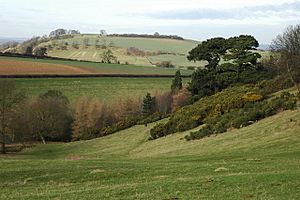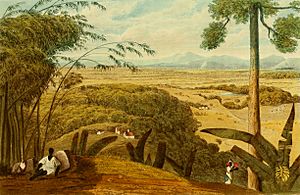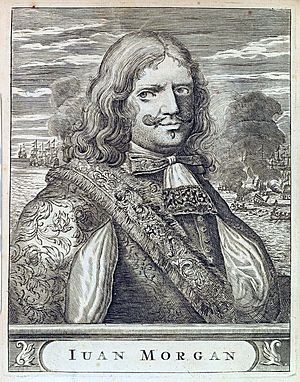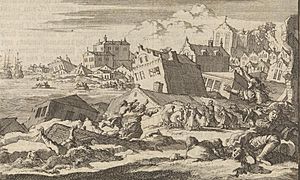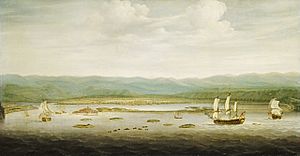Fulke Rose facts for kids
Quick facts for kids
Fulke Rose
|
|
|---|---|
| Born | 10 April 1644 Mickleton, Gloucestershire, England
|
| Died | buried 29 March 1694 (aged 49) London, England
|
| Nationality | British |
| Occupation | Land-owner/Slave-owner in Jamaica |
| Medical career | |
| Profession | Physician |
| Notable works | Treated Henry Morgan |
Fulke Rose (born April 10, 1644 – died around March 1694) was a British doctor and one of the first European settlers in Jamaica. He owned a lot of land on the island. He also continued to work as a physician in Jamaica. He even helped treat the famous former privateer, Henry Morgan, near the end of Morgan's life.
Early Life and Family Background
Fulke Rose was born on April 10, 1644, in a place called Mickleton, in Gloucestershire, England. His parents were Thomas and Francesse Rose.
He had several brothers and sisters. His brothers Thomas and Francis also lived in Jamaica. Another brother, John, was a merchant in London. His brother William was an apothecary, which is like a pharmacist.
In 1678, Fulke Rose married Elizabeth Langley in Port Royal, Jamaica. They had three daughters named Elizabeth, Anne, and Mary.
Fulke Rose's Career in Jamaica
By 1670, Fulke Rose was living in Jamaica. He already owned a large amount of land, about 380 acres, in Saint Catherine Parish. At this time, Jamaica was changing. It was moving from an economy based on piracy to one focused on farming. Large farms, called plantations, were set up to grow crops like sugar. These plantations relied on the labor of enslaved people.
In 1684, official papers described Rose as a "surgeon bred," meaning he was trained as a doctor. They also said he was a "very discreet and virtuous man." His plantations earned him a lot of money each year, and his medical practice also brought in a good income.
Fulke Rose was one of the main people in Jamaica who bought enslaved people from the Royal African Company. He purchased 131 individuals. Most of these people came from West Africa, specifically from areas known as the Bight of Benin and the Gold Coast (which is now modern Ghana).
He owned many estates and pieces of land across Jamaica. These included the Mickleton, Knollis, and Sixteen Mile Walk estates in St Thomas in the Vale. He also owned land and houses in St Jago de Laviega (now called Spanish Town). In England, he owned farms in Kent.
Like other important landowners in Jamaica, Fulke Rose was also an officer in the local militia. This was a group of citizens who acted as soldiers to protect the island. He was also elected to the House of Assembly of Jamaica in 1677, representing Saint Thomas in the Vale. He was also a member of the Legislative Council of Jamaica, which helped make laws for the island.
In early 1688, Fulke Rose and another doctor named Hans Sloane treated the famous former privateer, Henry Morgan. Morgan was suffering from a swollen belly and other health problems. The doctors believed his issues were due to his lifestyle. They tried different medicines and treatments to help him recover.
Even though Morgan seemed to get better for a while, he eventually became ill again. He consulted other doctors, but he passed away in August 1688.
Later Life and Legacy
In 1692, a terrible earthquake hit Jamaica, and the city of Port Royal was almost completely destroyed. After this event, Fulke Rose traveled to London, England.
He died in 1694 and was buried at St Peter's church in Cornhill, London, on March 29, 1694. A year later, his widow, Elizabeth Langley Rose, married Sir Hans Sloane. This meant that a share of the money from Fulke Rose's estates eventually went to Sloane. Sloane regularly received shipments of sugar from these estates for many years.
 | Valerie Thomas |
 | Frederick McKinley Jones |
 | George Edward Alcorn Jr. |
 | Thomas Mensah |


